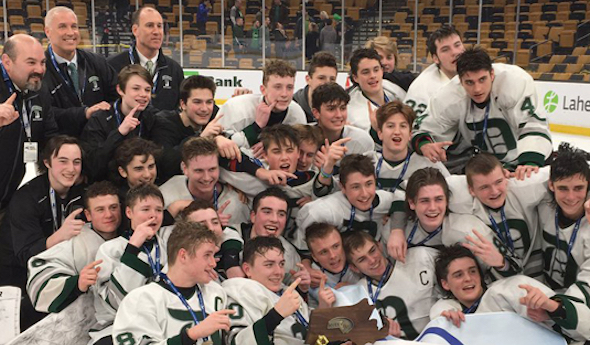
Title Time Differs Among Hockey States
July 12, 2019
By Rob Kaminski
MHSAA benchmarks editor
Next season’s three-week playoff format for the MHSAA Ice Hockey Tournament will fall more closely in line with similar postseasons for state associations around the country which sponsor the sport.
According to 2017-18 National Federation of State High School Associations participation statistics, 18 states sponsor boys ice hockey.
Michigan ranked third in number of schools involved with 240, behind Minnesota (282) and Massachusetts (278). In terms of overall participants, the MHSAA was fourth with 3,353, trailing Massachusetts (7,377), Minnesota (5,751) and New Jersey (3,492) and just ahead of New York (3,088). Wisconsin and Ohio boast more than 2,000 participants annually.
So, how do the tournaments compare among those states similar to Michigan? Most use longer tournament calendars than the two-week span previously employed by the MHSAA.
The timeframe for the season just past in the Minnesota tournament had most play beginning Feb. 21 and ending the same day as the MHSAA Finals, March 9. Some teams started on Feb. 19. The MHSAA dropped the puck for its first games on Monday, Feb. 25. It should be noted that Minnesota crowns just two champions annually, compared to the MHSAA’s three divisions.
Meanwhile, in Wisconsin and Ohio, just one school takes the statewide title each year, so it stands to reason that the postseason is spread out even further. Both states began the 2019 playoffs on Monday, Feb. 11.
Wisconsin’s tourney culminated on March 2 at Veteran’s Memorial Coliseum in Madison as teams played the Quarterfinals, Semifinals and Final over three consecutive days.
Ohio, meanwhile, took a week-long break following District Finals on March 1 or 2, then played the Semifinals and Final at Nationwide Arena in Columbus during March 8-9. This is similar to the rest period the MHSAA will enjoy moving forward from its Quarterfinals to the Semifinals and Finals in 2020.
Just as the season was reaching its pinnacle in Wisconsin, the postseason title chase was merely beginning in Massachusetts, where this year it opened Feb. 25.
Massachusetts is tied for the most divisions of the states studied here with four, but the top division is created with a different twist.
“The top division is often called the ‘Super 8’ or 1A. This tournament is set up differently than the other divisions,” said Massachusetts Ice Hockey Coaches Association President Dan Connolly. “The Super 8 is a double-elimination tournament. The seedlings for this tournament are done by power seeding via a committee using strength of schedule, record, team vs. teams under consideration and win-loss record down the stretch.”
Connolly said just 10 teams are chosen for the Super 8, and seed Nos. 7 through 10 must face off in a play-in game to join the top six. The two teams losing the play-in game return to their respective pre-assigned state divisions and can still win those tournaments. Such was the case in 2019, when Duxbury High lost in its bid to join the Super 8 field, but then won the Division 1 Final.
Like Michigan, those three divisions are based on enrollment, but unlike Michigan, the divisions are seeded based on winning percentage.
The Finals take place on a Sunday at the TD Garden in Boston, a celebration of hockey that features six games (four boys and two girls finals). This year’s event took place March 17, and nearly went into March 18. The Division 1 Final began at 9:59 p.m. as the previous contest, the Super 8 Final, went to four overtimes.
As mentioned, Minnesota’s tournament ended the same day as the MHSAA’s in 2019, and featured one overtime game among its two Finals at the Xcel Energy Center in St. Paul as Edina took the top class over Eden Prairie, 3-2.
The Sunday finales in Boston might seem foreign to followers of MHSAA tournaments, but New York also features a Sunday as the stage for its two state Finals, following Semifinals on Saturday. This year’s playoffs went from Feb. 20-March 10, culminating at the Harborcenter in Buffalo.
Neighboring New Jersey comes closest in length to the old MHSAA format with four divisions – three public and one non-public – taking just 14 days to determine winners at the Prudential Center in Newark. The 2019 titles were determined on Monday, March 4, with Semifinals the Wednesday prior.
PHOTO: Duxbury celebrated Massachusetts’ Division 1 championship this past season after missing out on making the “Super 8” bracket.
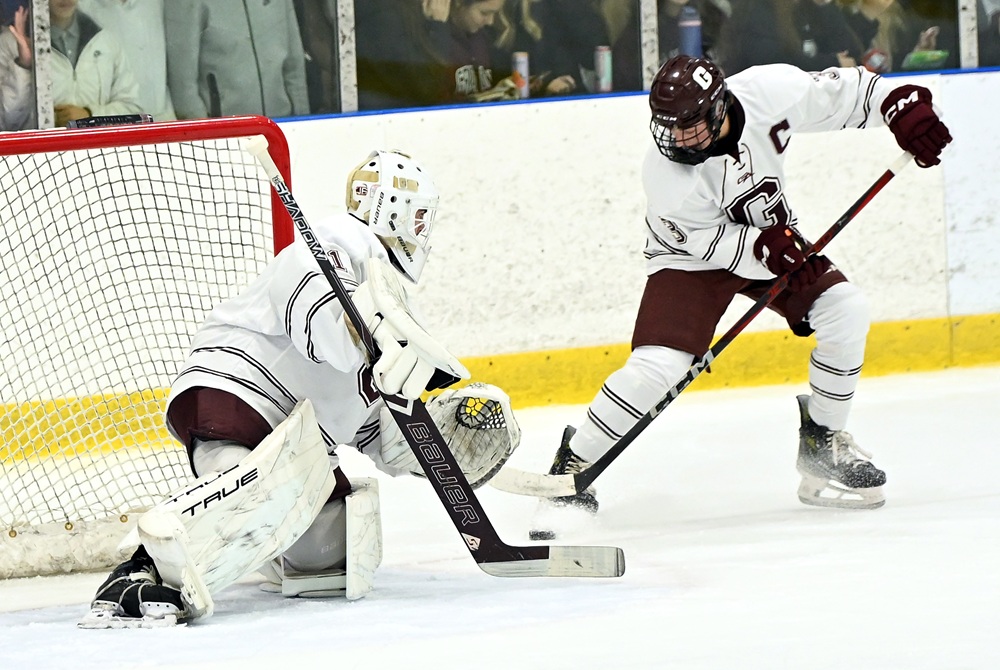
Grandville Seniors Striving to Finish Time Together with Another Memorable Run
By
Dean Holzwarth
Special for MHSAA.com
December 19, 2025
GRANDVILLE – A talented group of nine seniors on the Grandville hockey team have been playing together since they first learned to skate.
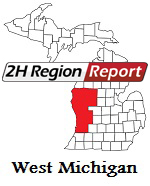 Now, in their final season on the ice, they have sights fixed on ending their careers with another successful campaign.
Now, in their final season on the ice, they have sights fixed on ending their careers with another successful campaign.
“It's been really nice to play one last time with some of the guys you’ve been playing with since the youth hockey years and then playing together all four years in high school,” senior goalie Ayden Karas said. “ The chemistry and bond we’ve had all together really makes it one big family.”
Grandville senior Braden Vander Veen sees it as one last opportunity to make a lasting impact on the program.
“It’s been awesome to play with all these guys, and we have a ton of chemistry,” Vander Veen said. “We know we only have a certain amount of time left with each other, so we are just trying to leave it all out there.”
The Bulldogs, who lost in last year’s Division 2 Semifinal to eventual champion Flint Powers Catholic, have picked up where they left off en route to a solid 7-1-1 start to this season.
Longtime Bulldogs coach Joel Breazeale, who last month was recognized as the Michigan High School Coaches Association (MHSCA) Coach of the Year, said expectations remained lofty this winter with the return of several experienced players.
“Very happy with how we have played and I think the players would say they are pleased, but I don’t think they are surprised,” he said. “I think that’s the standard they’ve come to expect over the past two seasons, especially with this senior class that have been together with me since they were 4 or 5 years old. This is their opportunity to see it all the way through.”
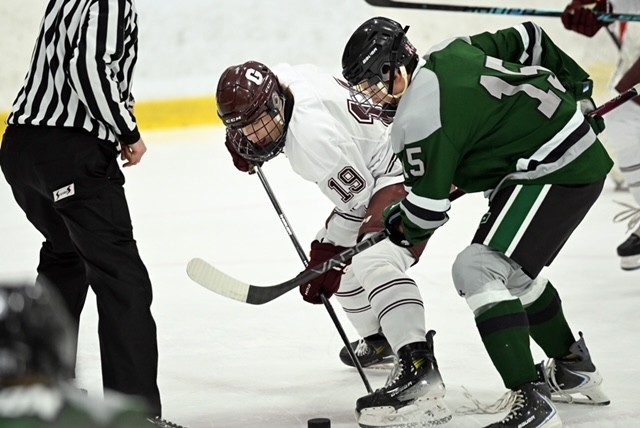 Grandville, currently ranked No. 4 in Division 2, dropped its first game to second-ranked Trenton at the West Michigan Showcase, but bounced back the next day to defeat one of the top teams in Division 3.
Grandville, currently ranked No. 4 in Division 2, dropped its first game to second-ranked Trenton at the West Michigan Showcase, but bounced back the next day to defeat one of the top teams in Division 3.
The Bulldogs rallied to knock off Houghton 4-3.
“We’ve had some good and solid close games with them, but we never had an opportunity to play them at a neutral site,” Breazeale said. “For our guys, especially with the returning boys, this was an opportunity that we don’t get too often and they just dug a little deeper.
“I thought we played wonderfully the night before against Trenton but the game got away from us, and I felt like the kids came out in the second period (against Houghton) and just picked up where they left off and their coach said that they just couldn't keep up with our guys. We were remarkably consistent with our energy and our ability to stay on top of the puck, constant pressure.”
It was the first time the seniors had beaten Houghton.
“That was huge,” Vander Veen said. “Obviously the night before we played Trenton, which was our first real test, and then beating Houghton, who is one of the best teams in the state, felt great. It really gave us a lot of confidence.”
Six of Grandville’s wins have been shutouts as an aggressive defense and stout goaltending have been complemented by timely goal scoring from a balanced line-up.
“I feel like the season has been going pretty well, we’ve had some good games the past couple weeks,” Karas said. “The defense has been a really big reason why I've performed so well, and they've always been really helpful in front.
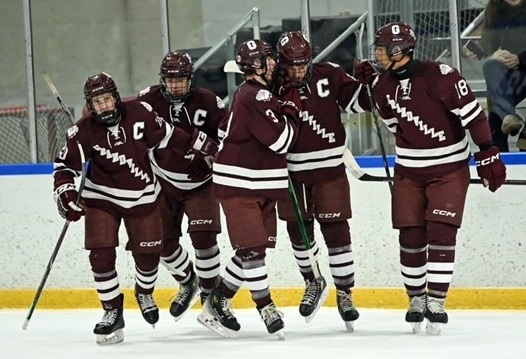 “Expectations were really high this year, especially coming off a final four run last year, but it's a new team and a new year.”
“Expectations were really high this year, especially coming off a final four run last year, but it's a new team and a new year.”
A promising group of younger players also have blended in well to provide depth.
“We have a ton of experience, and we took in a lot of young guys this year,” Vander Veen said. “It’s huge being able to mentor those guys and carry on with the success that we had last year. We have a lot of guys coming back who are hungry for more.
“We have definitely put in a ton of work in the offseason and with what we did last year, we were expecting to be up there this year. We are working toward that final four run again.”
Breazeale is looking for continued growth from his team as the season progresses.
“Marginal gains is what we’re focused on with the returning players, and then really hoping to see a jump from the new sophomores and juniors on the team,” he said. “The larger gains from our newest members will really determine how competitive we are with our depth because for any team to be successful it’s going to take more than just the leading cast members.”
The Bulldogs host Hudsonville on Friday before another road test Saturday against Rockford.
 Dean Holzwarth has covered primarily high school sports for Grand Rapids-based WOOD-TV for five years after serving at the Grand Rapids Press and MLive for 16 years along with shorter stints at the Ionia Sentinel and WZZM. Contact him at [email protected] with story ideas for Allegan, Kent and Ottawa counties.
Dean Holzwarth has covered primarily high school sports for Grand Rapids-based WOOD-TV for five years after serving at the Grand Rapids Press and MLive for 16 years along with shorter stints at the Ionia Sentinel and WZZM. Contact him at [email protected] with story ideas for Allegan, Kent and Ottawa counties.
PHOTOS (Top) Grandville’s Braden Vander Veen (3) gets his stick on the puck as goalie Ayden Karas walls off that side of the net during a game this season. (Middle) Luke DeBoer (19) takes a faceoff against Jenison. (Below) A group of Bulldogs skate side by side, including Vander Veen and Lewis Gardine (18). (Photos by Jenn Bellgraph Photography.)

